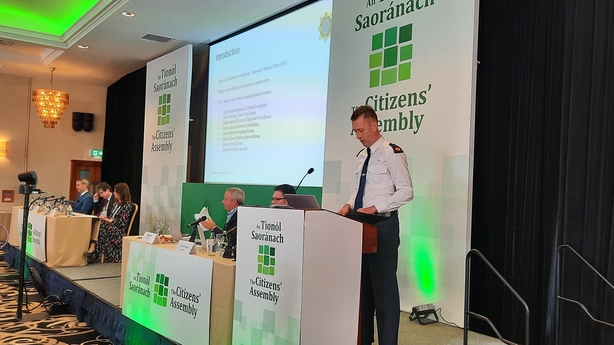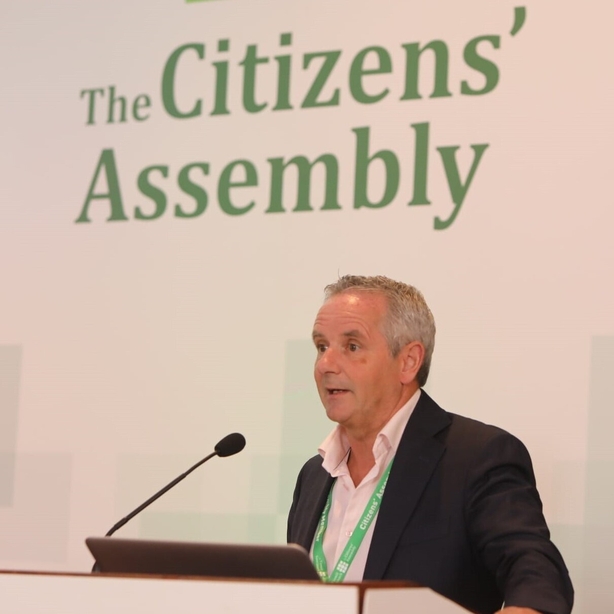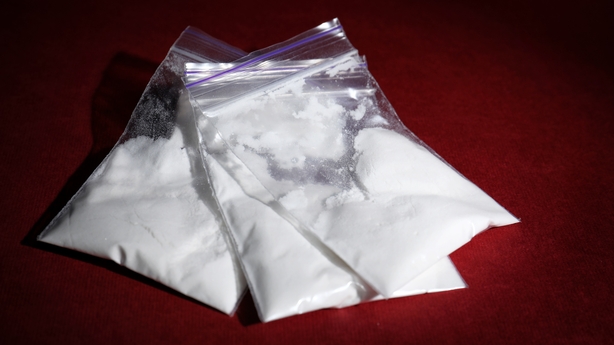A representative of An Garda Síochána's Organised and Serious Crime Unit has expressed concern over any potential legalisation of drugs in Ireland at the first meeting of the Citizens' Assembly on Drug Use.
This morning, 100 members of the assembly heard from a range of speakers addressing the national, European and international perspectives on drugs use across the issues of prevention, treatment, rehabilitation, human rights, criminal justice and organised crime.
Assistant Commissioner Justin Kelly told the Citizens' Assembly that where this had happened abroad, it had resulted in an increase in crime.
He said legalisation would likely result in drugs tourism (people travelling to destinations for drug use), drugs use in open spaces, such as public parks, and drug driving.
Last year, 2,700 people were arrested for drug driving in Ireland.
Following the legalisation of cannabis in Canada, drug driving doubled according to the Assistant Garda Commissioner.
While some have called for the State to regulate and tax the provision of drugs, he pointed out that cocaine was only produced by cartels in South America and these are responsible for huge numbers of deaths.

"It would be unconscionable for the Irish State to source cocaine from cartels," he said.
Assistant Commissioner Kelly said most of the criminals supplying drugs in Ireland do not live here.
40% of criminal networks operating in the EU are involved in drug trafficking and 60% of criminal networks operating in the EU use violence.
When this filters down through society to people who use drugs - he said many commit crime to fuel their addictions.
These range from theft to murder.
He expressed particular concern over drug related intimidation - where drug debts are levied against families.
The Assistant Commissioner stressed the importance of education around drugs.
He pointed out that there was a disconnect between those who use drugs regarding the impact around the world.
He said the garda liaison officer based in Bogotá had witnessed the impact and damage to Colombia and the Colombian people by people who use drugs.

Assistant Commissioner Kelly said more resources around homeless issues, addiction and mental health was required because "they're causes of a lot of drug addiction".
The Assistant Secretary of Criminal Justice Policy at the Department of Justice Ben Ryan said they have been looking at different approaches by other countries.
While he said the department had looked at the Portuguese model (where drugs were decriminalised), he pointed out that Portugal had a different legal system to Ireland.
This means that due to the common law system in Ireland, it would not be as straightforward.
Where drugs use was legalised in the US, he said drug tourism had gone up and while it may be legal in some states, there was still a large illicit market.
He said Germany was moving towards a more liberal model and Ireland would be watching to see if learnings could be taken from that.

"It's difficult not having a unified EU approach. Even if there was, we've a land border with a non-EU region, so there would be a huge issue with smuggling," he said.
Mr Ryan said if decriminalisation was introduced, a certain amount of dealers would "adapt".
Earlier, members were given an international perspective to drug use.
Giovanna Campello of the UN's Prevention Treatment Rehabilitation Section said evidence-based treatment decreased drugs use as well as overdoses and crime.
She explained that the mandate of her organisation was to promote alternatives to conviction.
Dr Eoghan Quigley of the European Monitoring Commission outlined its latest annual review regarding the drug situation in Europe.

He said opioids were present in around three-quarters of all drug-induced deaths in Europe.
The research indicated that drug supply bounced back following the Covid-19 pandemic.
Asked by one member if drug seizures had a meaningful impact on addressing supply, Dr Quigley pointed out that seizures largely reflected policing resources.
He cited the Port of Antwerp in Belgium as a location where "a lot of cocaine is being seized and detected by police".
Dr Quigley said this was due to an increase in resources for port police and an intense focus on trafficking.
Thomas Kattau, who is the Deputy Executive Secretary of the Council of Europe's Pompidou Group, outlined the impact of drugs use from a human rights perspective.
He said sustainable drug policies are crucial in order to sustain human rights and the challenge for governments was to ensure their drug policies were effective in guaranteeing the rights of the individual as well as public safety.
"Cutting the balance in these is difficult," he said.
The Citizens' Assembly on Drugs Use began in Malahide yesterday.
The Assembly will hold its next meeting on the weekend of 13/14 May in Dublin Castle, where members will further explore issues around the impact of drugs use on individuals, including active engagement with representatives from drugs treatment and rehabilitation services and centres.
Read more
Assembly on drugs use meets for first time in Dublin
Session will be 'most open' discussion on drug use







